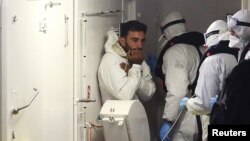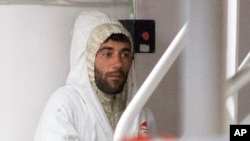Prosecutors blamed the Tunisian captain of a fishing boat for causing the deaths of hundreds of migrants locked below decks when his vessel capsized in the Mediterranean, in the weekend shipwreck that has shocked Europe.
Prosecutors said on Tuesday that Mohammed Ali Malek, 27, arrested under suspicion of multiple homicide, had mistakenly steered his severely overloaded boat into a collision with a merchant ship that was coming to its rescue. The prosecutors absolved the merchant ship of any responsibility for the tragedy.
Only 28 survivors have been brought to Italy from the hundreds of mainly African and Bangladeshi migrants on board. Police have quoted the survivors giving death tolls that range from 400 to 950 in what appears to have been the worst disaster ever among migrants fleeing across the Mediterranean to Europe.
So few survived because most of the migrants on board, including women and children, had been locked in the hold and lower decks of the three-deck fishing boat, Catania chief prosecutor Giovanni Salvi said.
Earlier Tuesday, prosecutors ordered the arrests of Malek and his Syrian first mate on suspicion of human trafficking. Both men are in police custody, while investigations continue, the prosecutors' office said.
Wake-up call
The U.N. refugee agency (UNHCR) said the death of more than 800 migrants is clearly another wake-up call for Europe, which must find the ways and means to address the escalating tragedies unfolding in the Mediterranean.
While U.N. officials welcome a 10-point action plan by European Union ministers, the devil is in the details, they said. UNHCR's director of international protection, Volker Turk, said the plan must prioritize the protection of asylum-seekers.
“There is a lot of emphasis on law-enforcement measures, on smuggling and trafficking, on various types of cooperation. We believe that, given the fact that there is a whole regional crisis that is adjacent to Europe, that displacement is not going to go awa," he noted. "If you look at some of the displacement numbers, we are talking about a global displacement crisis that is playing out at the doorsteps of Europe. It is clear, then, that the European political leadership will need to provide the appropriate response, which is built on the fundamental European values of human rights and human dignity.”
Volker said the UNHCR hopes the EU will incorporate into its plan a number of proposals it has made to ensure the protection of migrants. These include enhancing resettlement prospects for refugees, humanitarian admission and alternative legal channels allowing migrants to enter Europe. He said search-and-rescue operations should be increased and people should be screened to see if they qualify for international protection.
Currently, Greece, Italy, and Malta bear most of the burden of receiving and assisting the thousands of migrants crossing the Mediterranean. Volker says the European Union must agree upon a fair distribution of asylum-seekers in need of international protection among its member countries. As of now, he notes Germany and Sweden host most of the refugees coming from Syria.
Australian policy
Australian Prime Minister Tony Abbott, whose government recently approved tough new regulations on migrants seeking asylum, told reporters in Canberra Tuesday that Europe should do the same in order to prevent deaths at sea.
Australia's new rules employ the military to turn boats full of asylum-seekers away before they reach Australian shores, either sending them back to the nation from which they came, or to camps in the Pacific Islands of Nauru and Papua New Guinea.
Abbott said the only way to stop the deaths was to stop the boats.
EU emergency session
Earlier Monday, the head of the European Union called the 28 EU heads of state into emergency session to confront the unprecedented migrant crisis. That Brussels summit is set for Thursday.
A second migrant vessel crashed Monday near the Greek island of Rhodes, highlighting the unrelenting flow of African, Middle Eastern and South Asian refugees drawn to Europe by the twin promises of political stability and prosperity. More than 90 migrants were rescued, but three drowned.
European Council President Donald Tusk described the situation in the Mediterranean as "dramatic. It can not continue like this. We cannot accept that hundreds of people die when they try to cross the sea to Europe."
The European Union has come under mounting criticism for failing to develop an adequate response to the crisis. Last year, it scrapped a Mediterranean search-and-rescue program over concerns from some members that the maritime operations were in fact encouraging more migrants from Africa and beyond to make the perilous voyage to Europe.
Some material for this report came from Reuters














